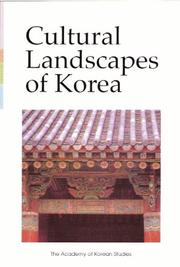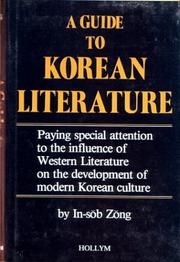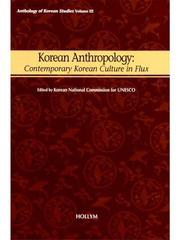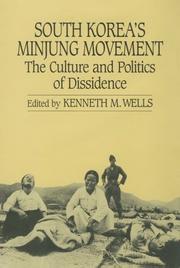| Listing 1 - 9 of 9 |
Sort by
|
Book
ISBN: 097796132X Year: 2007 Volume: 3 Publisher: Séoul, Corée du Sud KSCPP ; Yong Hwa
Abstract | Keywords | Export | Availability | Bookmark
 Loading...
Loading...Choose an application
- Reference Manager
- EndNote
- RefWorks (Direct export to RefWorks)
K9310 --- K9033 --- K9310.12 --- Korea: Society, social psychology and social-anthropological phenomena (South) Korea --- Korea: Philosophy and thought -- ethics --- Korea: Society, social psychology and social-anthropological phenomena (South) Korea -- general social ethics, morals and values
Book
ISBN: 8974330296 Year: 1994 Publisher: Seoul Yonhap News Agency
Abstract | Keywords | Export | Availability | Bookmark
 Loading...
Loading...Choose an application
- Reference Manager
- EndNote
- RefWorks (Direct export to RefWorks)
National characteristics [Korean ] --- National characteristics, Korean --- K9310.10 --- K9370 --- Korean national characteristics --- Korea: Society, social psychology and social-anthropological phenomena (South) Korea -- social identity and self --- Korea: Customs, manners, culture and folklore -- general and history --- Korea --- Civilization. --- National characteristics, Korean. --- Civilization

ISBN: 8988095871 9788988095874 Year: 2005 Publisher: Seoul: Jimoondang,
Abstract | Keywords | Export | Availability | Bookmark
 Loading...
Loading...Choose an application
- Reference Manager
- EndNote
- RefWorks (Direct export to RefWorks)
Korea --- Civilization --- Social life and customs --- K9310 --- K9370 --- K9335 --- K9200 --- Korea: Society, social psychology and social-anthropological phenomena (South) Korea --- Korea: Customs, manners, culture and folklore -- general and history --- Korea: Communities, social classes and groups -- local communities --- Korea: Geography and local history -- united and South Korea --- Korea - Civilization - 21st century --- Korea - Social life and customs - 21st century

ISBN: 0930878299 9780930878290 Year: 1982 Publisher: Elizabeth (N. J.): Hollym,
Abstract | Keywords | Export | Availability | Bookmark
 Loading...
Loading...Choose an application
- Reference Manager
- EndNote
- RefWorks (Direct export to RefWorks)
Korean literature --- History and criticism --- K9700 --- K9310.90 --- -Korea: Literature -- general and history --- Korea: Society, social psychology and social-anthropological phenomena (South) Korea -- cross cultural contacts and contrasts --- Korea: Literature -- general and history --- Korean literature - History and criticism. --- Korean literature - History and criticism --- LITTERATURE COREENNE --- KOREAN LITERATURE --- INTRODUCTION
Book
ISBN: 8970969411 Year: 1981 Publisher: Seoul National university Press
Abstract | Keywords | Export | Availability | Bookmark
 Loading...
Loading...Choose an application
- Reference Manager
- EndNote
- RefWorks (Direct export to RefWorks)
Korea [South ] --- Politics and government --- 1988 --- -Korea (Republiek). Politiek. --- Législation. Corée (République). --- Corée (République). Politique. --- Wetgeving. Korea (Republiek). --- Democratization --- K9310.90 --- K9500.80 --- Democratic consolidation --- Democratic transition --- Political science --- New democracies --- Korea: Society, social psychology and social-anthropological phenomena (South) Korea -- cross cultural contacts and contrasts --- Korea: Politics -- history -- modern period, postwar period (1945- ) --- Korea (South) --- Korea (Republiek). Politiek.

ISBN: 156591175X 9781565911758 Year: 2003 Volume: 3 Publisher: Elizabeth, NJ: Hollym,
Abstract | Keywords | Export | Availability | Bookmark
 Loading...
Loading...Choose an application
- Reference Manager
- EndNote
- RefWorks (Direct export to RefWorks)
Ethnology --- Folklore --- Anthropologie sociale et culturelle --- Research --- Recherche --- Korea --- Corée --- Social life and customs. --- Moeurs et coutumes --- Social life and customs --- K9370 --- K9310 --- Korea: Customs, manners, culture and folklore -- general and history --- Korea: Society, social psychology and social-anthropological phenomena (South) Korea --- Research. --- Corée --- Folk beliefs --- Folk-lore --- Traditions --- Manners and customs --- Material culture --- Mythology --- Oral tradition --- Storytelling --- Cultural anthropology --- Ethnography --- Races of man --- Social anthropology --- Anthropology --- Human beings --- Ethnology - Korea - Research --- Folklore - Korea - Research --- Korea - Social life and customs

ISBN: 0824817001 Year: 1995 Volume: *1 Publisher: Honolulu University of Hawaii Press
Abstract | Keywords | Export | Availability | Bookmark
 Loading...
Loading...Choose an application
- Reference Manager
- EndNote
- RefWorks (Direct export to RefWorks)
Populism --- -Nationalism --- -K9300.80 --- K9310.20 --- K9309 --- Consciousness, National --- Identity, National --- National consciousness --- National identity --- International relations --- Patriotism --- Political science --- Autonomy and independence movements --- Internationalism --- Political messianism --- History --- -History --- -Korea: Social sciences -- social and cultural history -- modern period, postwar period (1945- ) --- Korea: Society, social psychology and social-anthropological phenomena (South) Korea -- nationalism --- Korea: Social sciences, society -- social theory, movements and protests --- Korea (South) --- -Populism --- K9300.80 --- Korea: Social sciences -- social and cultural history -- modern period, postwar period (1945- ) --- Nationalism --- Korea [South ] --- 20th century --- 1960-1988 --- Populism - Korea (South) - History - 20th century. --- Nationalism - Korea (South) - History - 20th century. --- Korea (South) - History - 1960-1988.
Book
ISBN: 9781606061312 1606061313 Year: 2013 Publisher: Los Angeles: Getty museum,
Abstract | Keywords | Export | Availability | Bookmark
 Loading...
Loading...Choose an application
- Reference Manager
- EndNote
- RefWorks (Direct export to RefWorks)
Peter Paul Rubens’s fascinating depiction of a man wearing Korean costume of around 1617, in the collection of the J. Paul Getty Museum, has been considered noteworthy since it was made. Published to accompany an exhibition of Rubens’s Man in Korean Costume at the J. Paul Getty Museum from March 5 to June 9, 2013, Looking East: Rubens’s Encounter with Asia explores the various facets of Rubens’s compelling drawing of this Asian man that appears in later Rubens works. This large drawing was copied in Rubens’s studio during his own time and circulated as a reproductive print in the eighteenth century. Despite the drawing’s renown, however, the reasons why it was made and whether it actually depicts a specific Asian person remain a mystery. The intriguing story that develops involves a shipwreck, an unusual hat, the earliest trade between Europe and Asia, the trafficking of Asian slaves, and the role of Jesuit missionaries in Asia. The book’s editor, Stephanie Schrader, traces the interpretations and meanings ascribed to this drawing over the centuries. Could Rubens have actually encountered a particular Korean man who sailed to Europe, or did he instead draw a model wearing Asian clothing or simply hear about such a person? What did Europeans really know about Korea during that period, and what might the Jesuits have had to do with the production of this drawing? All of these questions are asked and explored by the book’s contributors, who look at the drawing from various points of view.
Rubens, Peter Paul --- Asia --- Rubens, Peter Paul, --- Criticism and interpretation --- J. Paul Getty Museum --- S17/2109 --- K9808.50 --- K9310.90 --- J6492.21 --- China: Art and archaeology--Musea and exhibitions: Belgium --- Korea: Art and antiquities -- history -- Chosŏn period (1392-1910) --- Korea: Society, social psychology and social-anthropological phenomena (South) Korea -- cross cultural contacts and contrasts --- Europe: Art and antiquities in Belgium --- Exhibitions --- Rubens, --- Rubens, P. P. --- Rubens, Pierre-Paul, --- Rubens, Pieter Paul, --- Rubens, Pieter-Pauwel, --- Rubens, Pietro Paolo, --- רובנס, פטר פאול, --- Criticism and interpretation. --- Getty (J. Paul) Museum. --- Getty Museum --- JPGM --- Museo J. Paul Getty --- Rubens, Pieter Paul --- Rubens --- Rubens, Pierre-Paul --- Rubens, Pieter-Pauwel --- Rubens, Pietro Paolo --- Rubens, Peter Paul, - 1577-1640. - Man in Korean costume - Exhibitions --- Rubens, Peter Paul, - 1577-1640 - Criticism and interpretation --- Rubens, Peter Paul, - 1577-1640. - Man in Korean costume --- Rubens, Peter Paul, - 1577-1640
Book
ISBN: 9780231172288 9780231540988 0231540981 0231172281 Year: 2016 Publisher: New York
Abstract | Keywords | Export | Availability | Bookmark
 Loading...
Loading...Choose an application
- Reference Manager
- EndNote
- RefWorks (Direct export to RefWorks)
The Imjin War (1592-1598) was a grueling conflict that wreaked havoc on the towns and villages of the Korean Peninsula. The involvement of Chinese, Japanese, and Korean forces, not to mention the regional scope of the war, was the largest the world had seen, and the memory dominated East Asian memory until World War II. Despite massive regional realignments, Korea's Chosôn Dynasty endured, but within its polity a new, national discourse began to emerge. Meant to inspire civilians to rise up against the Japanese army, this potent rhetoric conjured a unified Korea and intensified after the Manchu invasions of 1627 and 1636.By documenting this phenomenon, JaHyun Kim Haboush offers a compelling counternarrative to Western historiography, which ties Korea's idea of nation to the imported ideologies of modern colonialism. She instead elevates the formative role of the conflicts that defined the second half of the Chosôn Dynasty, which had transfigured the geopolitics of East Asia and introduced a national narrative key to Korea's survival. Re-creating the cultural and political passions that bound Chosôn society together during this period, Haboush reclaims the root story of solidarity that helped Korea thrive well into the modern era.
Nationalism --- War and society --- Society and war --- War --- Sociology --- Civilians in war --- Sociology, Military --- Consciousness, National --- Identity, National --- National consciousness --- National identity --- International relations --- Patriotism --- Political science --- Autonomy and independence movements --- Internationalism --- Political messianism --- History --- Social aspects --- Japanese Invasions of Korea (1592-1598) --- Manchu Invasions of Korea (1627-1637) --- Korea --- East Asia --- Asia, East --- Asia, Eastern --- East (Far East) --- Eastern Asia --- Far East --- Orient --- Influence. --- History, Military --- K9154 --- K9155 --- K9300.50 --- K9310.20 --- Korea: History -- Chosŏn period -- Japanese invasion, Imjin war (1592-1598) --- Korea: History -- late Chosŏn period, isolation, Qing dependency (1600-1895), Manchu invasions (1627, 1637) --- Korea: Social sciences -- social and cultural history -- Chosŏn period (1392-1910) --- Korea: Society, social psychology and social-anthropological phenomena (South) Korea -- nationalism
| Listing 1 - 9 of 9 |
Sort by
|

 Search
Search Feedback
Feedback About UniCat
About UniCat  Help
Help News
News